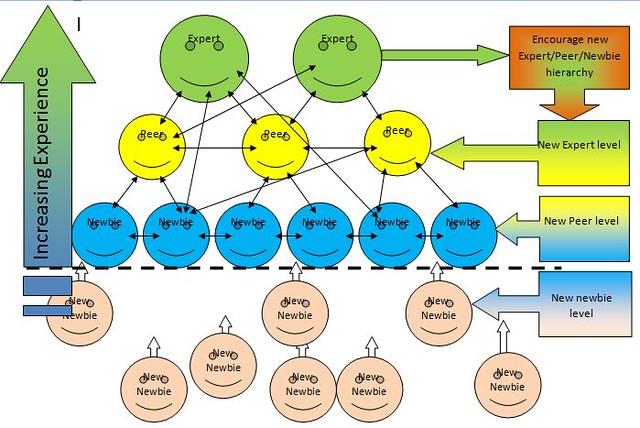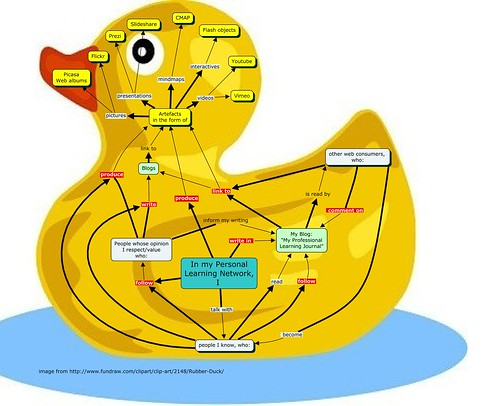Most of the big discussion on PLENK2010 this week seems to be about how quiet it has become around the discussion forums in the last couple of weeks and the value of lurking. I was only able to get my head in the game about the middle of the course and had a good two or three weeks of ideas and input (from my point of view) before other demands loomed and I had to drop out of sight again. A good deal of the course therefore, has for me, been spent lurking or gleaning. Occasionally I feel able to create a post or add a comment, but much of the time I am put off because I'm too far removed in time from the discussion.
Time is of the essence (but not available)
The problem I've had with the MOOC is more about the timing than anything else. It is difficult to keep up with the amount of discussion that takes place and because of the way my particular combination of web tools works, it is difficult to have a late comment (i.e. one added more than a couple of days after the bulk of the discussion has ended) discussed.
I've been using Netvibes as my aggregator and whilst I was keeping up to date it was great. But because it doesn't notify me of new additions to discussion posts, I haven't necessarily been aware of whether my comments have themselves engendered any discussion.
Lurking, I think, is a by-product of not being able to keep up. I haven't yet found a way of keeping track of all of the little discussions and postings and their associated ripples. I think this is a vitally important and missing part of the process since a PLN works because people respond to each other.
Lurkers may add the odd comment here and there but get discouraged because they aren't necessarily noticed by the rest of the pack, who have already moved on. I haven't really noticed the cat-i-ness that has been mentioned a few times over the last few weeks, but I wonder if that frustration is a result of comments and postings being "ignored". Human nature, in my experience, looks to blame people for the unpleasantness that comes their way, but I am convinced that quite a lot of this unpleasantness is just "the way it is", i.e. a part of the system, not the fault of individuals. What needs to happen then, is for course conveners to take a long hard look at the system and question whether it meets the needs of the participants?
Architects design, Engineers make the building stand up!
I know this isn't the fault of the MOOC conveners, but I wonder if the architecture of the course is actually counterproductive when used with a Moodle platform. We are trying to get Moodle up and running at our high-school and one of the problems is the course architecture. We can set different faculties up and have different years/subjects within the faculties, but then we are immediately stuck at trying to put everything else into the last remaining tier. Everything ends up looking too crowded and confusing.
The MOOC needs to be set up by topic rather than by week and they need to be kept open all the time. My reason for this is that, a discussion might come up in Week 2 that attracts some interest and people want to follow the discussion. The conversation may have various tags/topics/categories which could be associated with it.
Six weeks down the track, someone else raises a point that could be easily linked back to the initial discussion but isn't because few people are that aware of the huge number of tags/topics that were raised in Week 2, let alone those over the entire eight preceding weeks!
How one is meant to keep a track of all the different threads and discussions I don't know but I imagine it will have something to do with tags. I think that the PLENK twitter network and the associated hashtags may be what I'm trying to describe, but not having access to twitter on a regular basis has prevented me from really seeing its' potential.
The MOOC has become quite messy and unwieldy and difficult to navigate around. I find it really quite hard to find the list of readings for the beginning of each week without trying to backtrack through the Daily archives. I've got no idea where a particular discussion thread was unless someone points me to it. Overall, some of the important learning points are probably going to pass me by without me noticing, which seems a shame.
So, for PLENK2011, how should the course be organised?
Ideally, I would like individuals to engage in a MOOC in their own time. We all have other commitments, so it seems fair to assume that although I may post a comment in a timely manner, it may not be read for a while. When it is read, I would like to have any comments fed straight back to me.
Also, when I am running a couple of weeks behind schedule and trying to play catch-up I would like to be able to post comments or new discussions on old topics and have them read and commented on in return. This is easy for my blog so long as I actively encourage my PLN, but I have found a bit problematic with the Moodle.
Learning by Doing
In terms of continually encouraging new people to join in the conversation we need some mechanism by which they can actively participate in conversations that are old. After all the discussion in a PLN is what creates the learning, so excluding someone from the conversation just because they are 3 months behind everyone else isn't in keeping with the spirit of a PLN.
On the contrary, it would actually be beneficial for not-so-newbies to improve their own mentoring skills by assisting newbies along the way. However, this does require individuals to step up to the mark and take on these responsibilities as they arise.
I watched the Tom Chatfield's TED video the other day and wonder if some sort of incremental scoring system (like experience points) may be useful in determining whether someone should adopt a more responsible role within a PLN. Your PLN should include a certain number of experts, peers and newbies so that you are able to fill the roles of expert, peer and newbie yourself. Your "score" should be a rough average of the scores of those members of your network. When your score starts to rise above your PLN average, you start directing some of your "newbies" to assume responsibility for the new "newbies" coming into the system.
I've tried to represent this here:

The diagram seems quite limiting in that I've set it at three levels but that obviously isn't necessarily the case. Also one individual may appear in more then one network and at different levels.
Active Mentoring
I suppose the idea I'm trying to get across is that unless there is some architecture set up like this, the "new-newbies" coming in at the bottom do not have someone who is only slightly above their level of understanding helping them along the way. The pressure is all on the course conveners to try and encourage the "new-newbies" and those who have been in it from the beginning.
I think it is important for the the "peers" and "newbies" to assist the "new-newbies" because this in turn reinforces their own learning (the best way to learn is to teach). I also think the "experts" have the right to delegate some of their responsibilities further down the chain so that they can devote more energy to their own learning.
Of course, all of this interaction is published on course blogs and people know where they are because of the mind-maps and organisational structures that are published. It is important though that we all know roughly what level of expertise someone has. So we come back to a point raised in the PLENK forums a few weeks ago about how individuals describe themselves in their profiles. This may have been discussed, but I haven't managed to find it yet. ;)
In summary then;
- The MOOC needs to be structured so that learning is not limited by the time you have available to participate
- There needs to be some way of scoring within a PLN so that it is easy for individuals to see how they compare with other members of their network:
- this will encourage new-newbies to participate if they can see that the bulk of members of the network they are joining aren't too far ahead of them
- it will also allow experts to estimate the level of understanding of the peers and newbies in their network and delegate some mentoring responsibilities to them
- All of the artifacts produced by individuals within the course need to be tagged in a way which is easily navigated, so someone (or someones) need to arrange organisational maps of the tags that are easy to find and use.
- The artifacts need to be accordingly mapped into the organisational map so that individuals on their learning journey can see if they are headed down a path already well-worn by previous MOOCers
Fairwell and Adieu you Fare PLENKish Ladies (and Gents)
I joined this course with no expectations. I'd done nothing like it before and had never heard the term Personal Learning Network. I'd never really understood the educational buzz about "collaborate, communicate and create" replacing the 3 R's. I've come away from the course with an astounding wealth of knowledge about new tools and technologies and have learned the names of a few people who I will continue to follow and converse with in the future. I am also trying to work out how I can best incorporate PLN's into the architecture of learning in my high school. They seem such a simple and yet powerful resource for learning.
Ultimately, I think the MOOC has broadened my horizons about the term "life-long learner" and given me a view of how modern technologies can have a huge impact on the efficacy of an individuals learning journey.
Long may my own journey continue.



